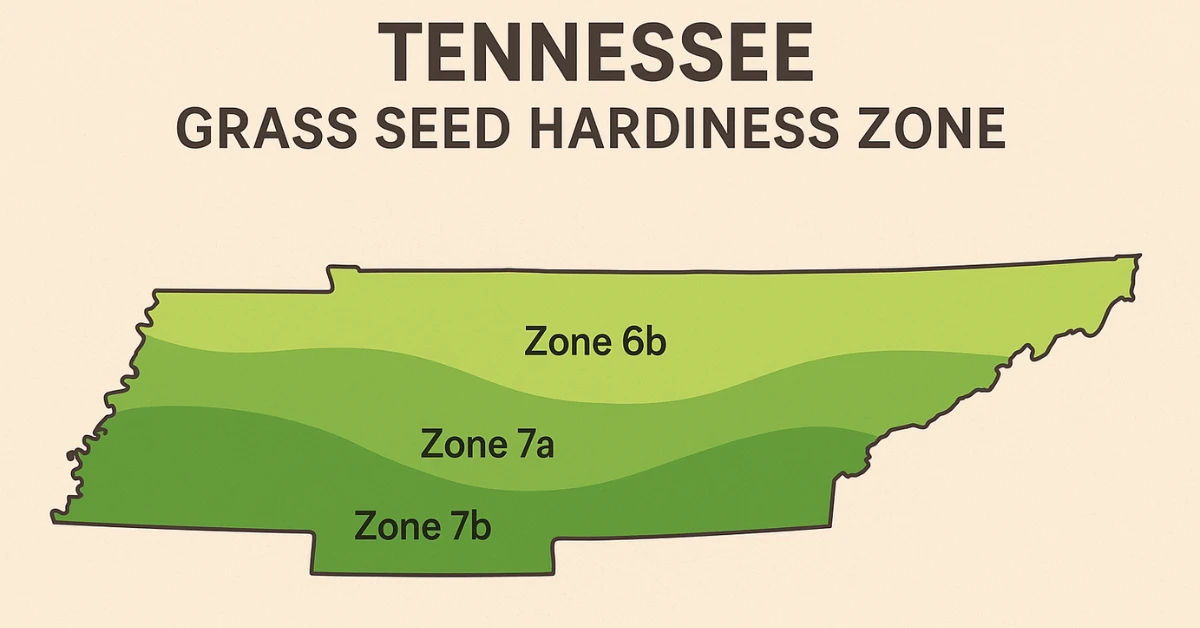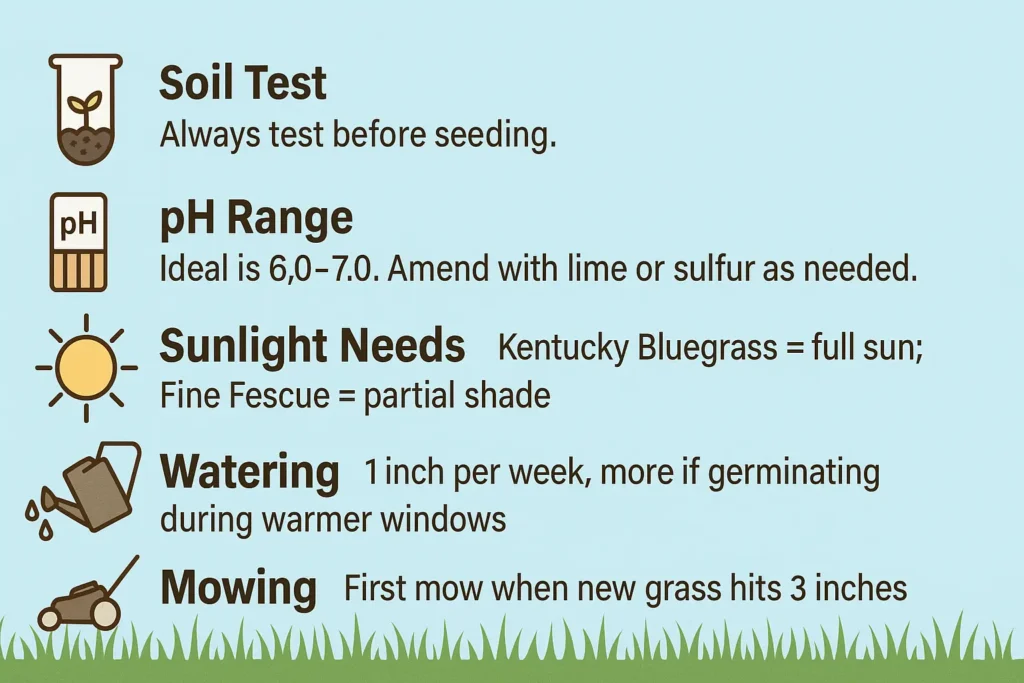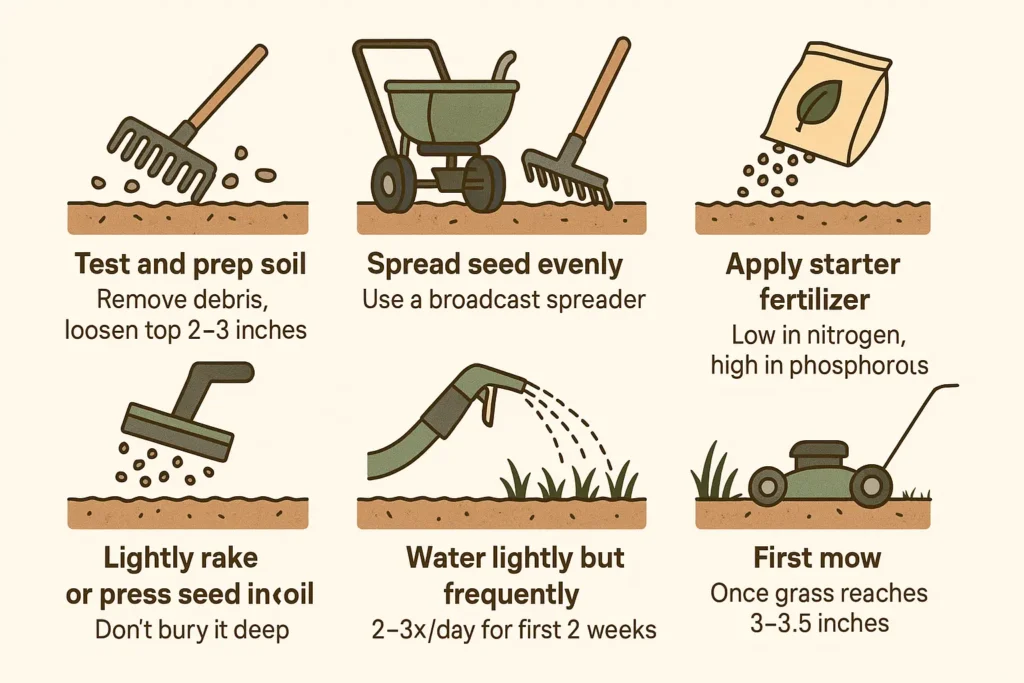When to Plant Grass Seed in Tennessee: A Complete Seasonal & Regional Guide

Tennessee’s climate varies more than you might think—from the mountains in the east to the river plains in the west. This range makes it crucial to time your seeding right. If you’re wondering when to plant grass seed in Tennessee, this guide will break down everything you need to know: ideal seasons, top-performing grass types, hardiness zones, and proper planting techniques.
Whether you’re in Nashville, Knoxville, or Memphis, you’ll leave with a solid plan for a thriving lawn.
Best Time to Plant Grass Seed in Tennessee
The best time to plant grass seed in Tennessee depends on where you live and what type of grass you’re using. Tennessee sits in the transition zone, which means both cool-season and warm-season grasses can grow—if planted at the right time.
For cool-season grasses like Tall Fescue and Perennial Ryegrass:
- Best time: Mid-September to mid-October
- Backup: Late February to early April
For warm-season grasses like Bermudagrass and Zoysiagrass:
- Best time: Mid-April to early June
So if you’re searching for the right timing, the short answer to when to plant grass seed in Tennessee is: early fall for cool-season and late spring for warm-season grasses.
Tennessee’s USDA Hardiness Zones
Tennessee spans USDA Zones 6a to 8a, with elevation and latitude playing key roles in your local microclimate. These zones help determine which grass types will thrive and when it’s safe to plant.
Zone: 6a–6b
Region: Eastern TN, higher elevations
Grass: Best for cool-season grasses like Fescue
Zone: 7a–7b
Region: Central TN
Grass: Supports both cool- and warm-season types
Zone: 8a
Region: Western TN
Grass: Ideal for warm-season grasses like Bermuda
If you’re unsure when to plant grass seed in Tennessee, check your zone first. Higher zones allow for earlier planting, while lower zones benefit from later fall or dormant seeding.
🔍 Not sure what zone you’re in? You can look up your zone here.
Best Grass Seed Types for Tennessee Lawns
Choosing the right seed is as important as timing. Tennessee lawns benefit from blends that account for temperature swings, shade, and foot traffic. Here’s what works best:
Tall Fescue
A cool-season grass that thrives across most of Tennessee. It’s drought-tolerant, wears well under foot traffic, and germinates relatively quickly. Works well in both sunny and partially shaded yards.
Perennial Ryegrass
A fast-germinating cool-season grass often used in blends or for overseeding. Not great for long, hot summers, but useful in spring and fall transitions.
Bermudagrass
The most common warm-season lawn grass in Tennessee. Loves sun and heat, but goes dormant (brown) in winter. Ideal for open yards and athletic fields.
Zoysiagrass
Another warm-season option with finer texture and better shade tolerance than Bermuda. Slower to establish, but low maintenance once rooted.
Knowing when to plant grass seed in Tennessee also means understanding which of these grasses works for your region and soil conditions.
Tennessee Grass Seeding Schedule (By Season)
Let’s break down the calendar based on climate:
Spring:
- Best for warm-season grasses
- Plant from mid-April to early June
- Ensure soil temps are consistently above 60°F
Fall:
- Ideal for cool-season grasses
- Seed from mid-September to mid-October
- Soil is still warm, and rainfall is consistent
Summer:
- Risky without irrigation
- Can plant Bermuda or Zoysia in June with care
- Watch for drought stress
Winter (Dormant Seeding):
- Optional strategy in late November to December
- Only for cool-season seeds like Tall Fescue
- Seeds lie dormant until spring warms soil
If you’re wondering when to plant grass seed in Tennessee for maximum results, fall is your safest bet for cool-season, while spring is key for warm-season lawns.
Soil, Water, and Sunlight Considerations
A successful seeding job goes beyond timing. Here’s what else matters in Tennessee:
- Soil test first: Many Tennessee soils are clay-heavy and may need aeration or compost
- Ideal pH: 6.0 to 6.5 for most turfgrasses
- Sunlight: Bermuda and Zoysia need full sun; Tall Fescue handles some shade
- Watering: Keep new seed moist—2–3 light waterings/day for first 2 weeks
- Mowing: Mow when grass reaches 3 inches tall
Without proper prep, knowing when to plant grass seed in Tennessee won’t be enough. Soil and water are equally critical.
Common Mistakes to Avoid
Many Tennessee homeowners struggle with these errors:
- Seeding too late in fall: Seed doesn’t root before frost
- Seeding too early in spring: Cold snaps ruin germination
- Wrong grass type: Cool-season in full sun = stress
- Skipping starter fertilizer: Slows root growth
- No soil prep: Compacted soil = weak root system
The window for when to plant grass seed in Tennessee is narrow—missing it can set your lawn back a whole season.
How to Plant Grass Seed in Tennessee (Step-by-Step)
- Prep your lawn: Clear debris and loosen the top 2 inches of soil
- Spread seed evenly using a broadcast or drop spreader
- Rake lightly or roll the surface to press seed into soil
- Apply starter fertilizer with high phosphorus content
- Water frequently (2–3x per day) until germination
- First mow at 3 to 3.5 inches, depending on grass type
Even if you’ve nailed when to plant grass seed in Tennessee, the execution matters just as much.
Regional Planting Notes for Tennessee
Tennessee’s elevation and climate vary from east to west. Adjust your seeding window slightly based on where you live:
East TN
Higher elevation = later fall planting; stick with Tall Fescue
Middle TN
Ideal for both cool and warm-season blends
West TN
Earlier spring seeding for warm-season types like Bermuda
Memphis Area
Zone 8a allows for longer warm-season growth; consider Zoysia
Understanding where you are helps refine when to plant grass seed in Tennessee even further.
Tools and Guides to Help You Succeed
For tailored lawn planning, check out our in-house tools and calculators:
- ✅ Grass Seed Calculator
- ✅ Lawn Fertilizer Calculator – Apply the right amount of nutrients based on lawn size and grass type
- ✅ Lawn Mowing Cost Calculator – Estimate mowing expenses by lawn size, frequency, and contractor pricing
- ✅ Lawn Care Cost Calculator – Budget for overseeding, watering, fertilizing, and more
These tools go beyond general tips to help you plan based on your location, lawn size, and seed type.
Referenced Expert Guide
Looking for science-backed methods for seeding success? Explore this research-backed guide on sowing grass seed by Conservation Evidence. It covers tested methods for seed establishment across environments, and reinforces the timing principles we recommend here.
It’s a great complement if you’re experimenting or want data-backed decisions.
Final Thoughts: When to Plant Grass Seed in Tennessee
To wrap up, the best time to plant grass seed in Tennessee is:
- Mid-September to mid-October for cool-season grasses like Tall Fescue
- Mid-April to early June for warm-season grasses like Bermuda
- Consider your region’s USDA zone and local climate patterns
Seeding success comes from timing + preparation. Now that you know when to plant grass seed in Tennessee, put that knowledge into action.
Need more help?
Check out our full regional seeding guide:
Best Time to Plant Grass Seed (Guide)
This will walk you through other states, seed types, and tools—so you can get every square foot of your lawn off to the right start.


